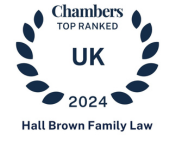Family Mediation
Resolving disputes as amicably as possible.
At Hall Brown Family Law we are dedicated to helping separated families resolve disputes as amicably as possible. Whilst we accept that in some circumstances it may be appropriate for matters to be resolved through lawyers, we recognise that in many cases issues can be resolved by giving individuals the opportunity to sit down together to discuss their concerns and generate options to resolve matters.
In such circumstances mediation can be an invaluable tool to help such discussions resulting in realistic and workable solutions to enable separating families to reach an outcome that they can
both live with.
Mediation can assist participants in reaching arrangements for both financial and children matters. Mediation is a means of resolving disputes in an amicable, non-confrontational manner that meets the needs of both participants. It is a quicker, more amicable, and less stressful process than the more traditional route at resolving disputes. It also focuses participants to put the needs of any child or children at the forefront of any discussions taking place.
Hall Brown Family Law are able to offer a bespoke mediation service to assist separating families in any children or financial disputes that they may be facing.
What does the mediation process look like?
Step 1 – Mediation Information and Assessment Meeting (MIAM)
Before mediation can begin both participants need to attend a separate confidential meeting with a mediator known as a ‘Mediation Information Assessment Meeting’, more commonly referred to as a MIAM. This meeting is very important, and the mediator will discuss the different options available separately so that an informed decision can be made as to the path that each participant wish to take to resolve their separation. The mediator provides information about mediation and how the process works along with other options of Dispute Resolution and the court process. It is also an opportunity for the mediator to assess if mediation is a suitable means of resolving the dispute by also undergoing a thorough suitability assessment and screening.
The session generally lasts between 50 to 90 minutes.
If the mediator deems mediation as suitable and if both participants agree to attend a joint session, then the mediator will make arrangements and discuss how the session will take place to ensure safety and that both participants feel able to be heard and able to speak freely.
The mediator is not there to take sides and their role is to facilitate the discussions between the participants to achieve an amicable solution.
During the assessment the mediator will also assess if any sign posting is required for emotional and legal support to assist them throughout the process.
Although the mediator may be a practicing solicitor themselves, they are unable to provide specific legal advice to either participant.
Step 2 – Joint mediation sessions
If the mediator assesses that mediation is a suitable means to resolve the participants dispute and that both are in agreement to attend a joint session, the mediator will arrange for a session to take place.
In the joint session, the mediator will be present along with both participants. In some cases, the participants would prefer not to see one another, therefore the session may take place on a shuttle basis. Generally, you will require at least two to three sessions, however you may require five to six sessions if your case involves children and particularly complex financial matters. The role of the mediator is to facilitate open conversations, and focus on moving forward, rather than explore issues that occurred in the past. Between sessions, we recommend you seek independent legal advice to ensure your needs are always met.
Step 3 – Reaching an agreement
In matters involving children, we write a Memorandum of Understanding that details all agreed proposals. This will be in the style of a ‘Parenting Plan’. At this stage, the Memorandum will not be legally binding, however you are open to seek independent legal advice regarding applying to court to make this an Order.
In financial matters, we write a Memorandum of Understanding that details all agreed proposals. We do not ordinarily draft the Consent Order, which is required to be lodged at Court in order to sever all financial ties. The Memorandum can be utilised by your solicitors to draft the Consent Order and lodge it at Court to make the agreement legally binding. As a solicitor mediator, we ensure that sufficient detail is included to limit any further legal costs and protracted correspondence.
What if no agreement is reached?
If attempts at mediation fail, we will try to steer you away from Court by suggesting different forms of dispute resolution such as arbitration, early neutral evaluation, hybrid mediation or private financial dispute resolution hearings. We aim to limit the issues outstanding which in turn should reduce legal costs and conflict between the participants.
What makes Hall Brown different?
As solicitor mediators, we offer a tailor-made mediation service. Our aim is to improve communication between participants by adopting a ‘proactive’, rather than ‘reactive’ approach.
We reach bespoke arrangements by assisting those newly separated to have immediate plans in place, while ensuring to discuss any issues that may arise in the future and how to handle them, therefore minimising the risk of any future conflicts.
As practising solicitor mediators, we ensure that any legal information provided is up-to-date, and we take time to ensure that all issues are dealt with in the session. Following each session, we prepare a Session Record which includes detailed, clear, and concise information to assist you in obtaining any legal advice between sessions. We actively encourage you to obtain independent legal advice throughout the mediation process and we understand how important it is to ensure any agreement reached is made into a legally binding document.
Any financial disclosure within mediation takes place by way of Form E, which is the document used within Court proceedings. This means that if mediation attempts were to break down, you would have a partially completed Form E to take forward into legal proceedings, without having to duplicate costs. Following exchange of Form E’s, we always prepare a detailed asset schedule that highlights points on which participants agree and disagree.
For all your Mediation needs, please speak directly to Sarah Manning, Head of Mediation and Partner at Hall Brown Family Law:
Email: sarah.manning@hallbrown.co.uk
Direct: 0113 841 9930, Mobile: 07523 687 356







